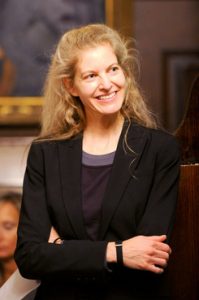Northwestern Is the Latest Top Law School to Name a Woman Dean
Kimberly Yuracko said she wants to make Northwestern University Pritzker School of Law a career resource for all alumni, not just recent graduates.
April 24, 2018 at 12:01 PM
5 minute read

Northwestern University Pritzker School of Law has named longtime professor Kimberly Yuracko as its next dean.
On Sept. 1 Yuracko will become the first woman to lead the Chicago law school, replacing outgoing dean Daniel Rodriguez. She joined the faculty in 2002 and has held various administrative roles, including interim dean in 2011. Yuracko is an expert in employment law, gender equity, and anti-discrimination law, and has written several books. We caught up with Yuracko to discuss her goals for the law school, the rise of women leading top law schools, and what she learned during her previous stint running the law school. Her answers have been edited for length and clarity.
Once you assume the deanship in the fall, women will be leading six of the top 12 law schools. (Yale; Stanford; Columbia; Virginia; Duke; and Northwestern.) Is that significant?
I think it's mostly reflective of the change in the profession—that women have now been entering the profession at 50-50 numbers for quite awhile. We've now had time to move up through the ranks. Also, it's probably somewhat a reflection of a change in the culture of the institutions and our nation generally whereby I don't think women in leadership is considered unusual at all. Everyone thinks it's perfectly normal. If they think a woman is the strongest candidate, not much thought is given to the fact that she's a woman.
Not only are you an insider at Northwestern, but you already did a stint as interim dean. Do you think that experience will help as you take the reins?
I think it's really helpful to have done that. Unlike in corporate America—where people move up from position to position and they incrementally take on more responsibility—in law schools the jump is usually from professor or associate dean to dean, which is just a dramatically different job. The one advantage is that I have a pretty good sense of what the job entrails, so there won't be that sort of culture shock.
Beyond that, I've had years to develop ties with the law school faculty and administration, and the university administration. I think that's so valuable because I know who to reach out to and I have friends and colleagues all across the university, which will be helpful in strengthening our ties with the university.
➤➤ Stay on top of developments and trends in legal education with Ahead of the Curve by Karen Sloan, a new weekly briefing from Law.com. Sign up here and get next week's email update straight to your inbox.
What are your goals for the law school?
My real focus over the first year or two is that I want to build upon Northwestern's goal to be a law school for life. What I mean by that is I want Northwestern to become known as the school that does the best job of developing and nurturing the human capital of their students, faculty and alumni. I think we already give our students a fantastic education and a great experience when they're here. I want to build on that with even more support: more professional support, more academic support.
In particular, I want to strengthen our connection and ties to our alumni by increasing the kind of career and professional support we provide throughout our graduates' careers. People are no longer taking their first job and staying there. They are moving around a lot. I think there's a lot more that law schools can do to be their touchpoint throughout their careers for additional education and career strategy support.
You've done a lot of work on diversity initiatives at the university. What do you think law schools can do to better foster racial and gender diversity on their faculties and in the profession?
In terms of faculty diversity, I'll speak to my own school for a second. I think one of the things that would be really helpful for us is to expand our focus in terms of subject matter and of methodological diversity. One of the things I think ends up happening a bit at my own school is we kind of do self-replication. There are certain fields and areas that are more gender lopsided. To the extent that we as a faculty begin to look more broadly at both candidates and the kinds of subject matter, research and methodology we are looking for, that really helps diversify the faculty.
Regarding diversity in the profession, this is a project I've been working on for the last year at Northwestern, but I have to admit we haven't made much headway yet. One of my hopes as dean at Northwestern is that we're going to reach out to the profession in a structured way. We're thinking about how we can work with GCs and managing partners to think about how we can move the needle on the 19 percent women partners at the equity level, which really hasn't changed in about 10 years.
Dan Rodriguez has taken a national leadership role in legal education, most recently leading the supporters of the GRE in law school admissions. Is that a role you envision taking on?
Dan is remarkable. He's a visionary and an extraordinary leader both of our institution and of legal education nationally. He's got remarkable amount of energy. I would love to keep up that profile on a national level. But my initial focus in the first year or so will be on our institution, and really building and strengthening our reputation.
This content has been archived. It is available through our partners, LexisNexis® and Bloomberg Law.
To view this content, please continue to their sites.
Not a Lexis Subscriber?
Subscribe Now
Not a Bloomberg Law Subscriber?
Subscribe Now
NOT FOR REPRINT
© 2025 ALM Global, LLC, All Rights Reserved. Request academic re-use from www.copyright.com. All other uses, submit a request to [email protected]. For more information visit Asset & Logo Licensing.
You Might Like
View All
Inside Track: Why Relentless Self-Promoters Need Not Apply for GC Posts

Companies' Obsession With Soft Skills Has Made Prized GC Posts Even Harder to Land
4 minute read
Meta Workers Aren't of One Mind on Company's Retreat From DEI, Fact-Checking

Trending Stories
- 1Uber Files RICO Suit Against Plaintiff-Side Firms Alleging Fraudulent Injury Claims
- 2The Law Firm Disrupted: Scrutinizing the Elephant More Than the Mouse
- 3Inherent Diminished Value Damages Unavailable to 3rd-Party Claimants, Court Says
- 4Pa. Defense Firm Sued by Client Over Ex-Eagles Player's $43.5M Med Mal Win
- 5Losses Mount at Morris Manning, but Departing Ex-Chair Stays Bullish About His Old Firm's Future
Who Got The Work
J. Brugh Lower of Gibbons has entered an appearance for industrial equipment supplier Devco Corporation in a pending trademark infringement lawsuit. The suit, accusing the defendant of selling knock-off Graco products, was filed Dec. 18 in New Jersey District Court by Rivkin Radler on behalf of Graco Inc. and Graco Minnesota. The case, assigned to U.S. District Judge Zahid N. Quraishi, is 3:24-cv-11294, Graco Inc. et al v. Devco Corporation.
Who Got The Work
Rebecca Maller-Stein and Kent A. Yalowitz of Arnold & Porter Kaye Scholer have entered their appearances for Hanaco Venture Capital and its executives, Lior Prosor and David Frankel, in a pending securities lawsuit. The action, filed on Dec. 24 in New York Southern District Court by Zell, Aron & Co. on behalf of Goldeneye Advisors, accuses the defendants of negligently and fraudulently managing the plaintiff's $1 million investment. The case, assigned to U.S. District Judge Vernon S. Broderick, is 1:24-cv-09918, Goldeneye Advisors, LLC v. Hanaco Venture Capital, Ltd. et al.
Who Got The Work
Attorneys from A&O Shearman has stepped in as defense counsel for Toronto-Dominion Bank and other defendants in a pending securities class action. The suit, filed Dec. 11 in New York Southern District Court by Bleichmar Fonti & Auld, accuses the defendants of concealing the bank's 'pervasive' deficiencies in regards to its compliance with the Bank Secrecy Act and the quality of its anti-money laundering controls. The case, assigned to U.S. District Judge Arun Subramanian, is 1:24-cv-09445, Gonzalez v. The Toronto-Dominion Bank et al.
Who Got The Work
Crown Castle International, a Pennsylvania company providing shared communications infrastructure, has turned to Luke D. Wolf of Gordon Rees Scully Mansukhani to fend off a pending breach-of-contract lawsuit. The court action, filed Nov. 25 in Michigan Eastern District Court by Hooper Hathaway PC on behalf of The Town Residences LLC, accuses Crown Castle of failing to transfer approximately $30,000 in utility payments from T-Mobile in breach of a roof-top lease and assignment agreement. The case, assigned to U.S. District Judge Susan K. Declercq, is 2:24-cv-13131, The Town Residences LLC v. T-Mobile US, Inc. et al.
Who Got The Work
Wilfred P. Coronato and Daniel M. Schwartz of McCarter & English have stepped in as defense counsel to Electrolux Home Products Inc. in a pending product liability lawsuit. The court action, filed Nov. 26 in New York Eastern District Court by Poulos Lopiccolo PC and Nagel Rice LLP on behalf of David Stern, alleges that the defendant's refrigerators’ drawers and shelving repeatedly break and fall apart within months after purchase. The case, assigned to U.S. District Judge Joan M. Azrack, is 2:24-cv-08204, Stern v. Electrolux Home Products, Inc.
Featured Firms
Law Offices of Gary Martin Hays & Associates, P.C.
(470) 294-1674
Law Offices of Mark E. Salomone
(857) 444-6468
Smith & Hassler
(713) 739-1250








